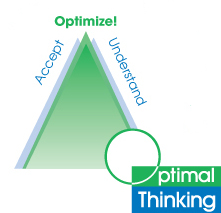Emotional Mastery with Optimal Thinking

You can take the wisest actions to minimize your troublesome feelings when you take responsibility for creating them. Embracing vulnerability is a sign of emotional intelligence, and your path to wholeness. Here’s the good news — you can easily learn emotional mastery.
Many people avoid, suppress, devalue and get stuck in disturbing feelings. They don’t know how to deal with them, or how to meet their needs. But emotional mastery can be experienced at home, in relationships, and in the workplace.
Emotions are invaluable allies that serve as your inner compass. They inform you whether your thoughts and actions are in harmony with your core self. Sometimes they guide you with a whisper, and if you don’t heed their message, they increase their volume until you are forced to pay attention.
Painful feelings alert you that your thinking or actions are not good for you, so that you can make changes in alignment with your soul’s highest calling.
You will experience your best feelings when your best self is in charge and your most important needs are met. So where does Optimal Thinking fit in? You have the best chance of meeting your needs when you think, feel, and give your best.
Optimal Thinking enables you to call forth your highest self to best meet your needs, achieve what is most important, and make the most of your feelings.
How to Master Disturbing Feelings
Accept Your Emotions
When you observe your emotions, you are no longer unconsciously identified with them or under their control. When you welcome your full range of emotions, the energy you used to judge and suppress them becomes available to optimize your life. Accepting responsibility for your feelings is the basis of creating your own happiness.
Understand and Learn from Your Disturbing Emotions
When you understand your emotions, you can interpret your responses and make sense of the world around you. Your feelings provide you with knowledge and understanding about yourself and others. After you identify the origin and purpose of the beliefs that are fueling your emotional turbulence, you can access the best response.
When you understand what you are doing to create your emotional turmoil, you can avoid unnecessary recurrence.
Determine the Best Way to Heal Disturbing Emotions
You are the source of all your feelings and are always responsible for your emotional responses, so make sure your primary focus is internal. Blaming others for your feelings is a waste of your energy. People and situations only trigger what is already inside you.
When you deal with your feelings as soon as you are aware of them, you are living wholly in the present moment where you can most influence your life. Of course, your perception and interpretation of current events is always colored by your past experiences.
As you uncover and correct the erroneous beliefs from the past that are causing you to create pain in the present, you will heal.


